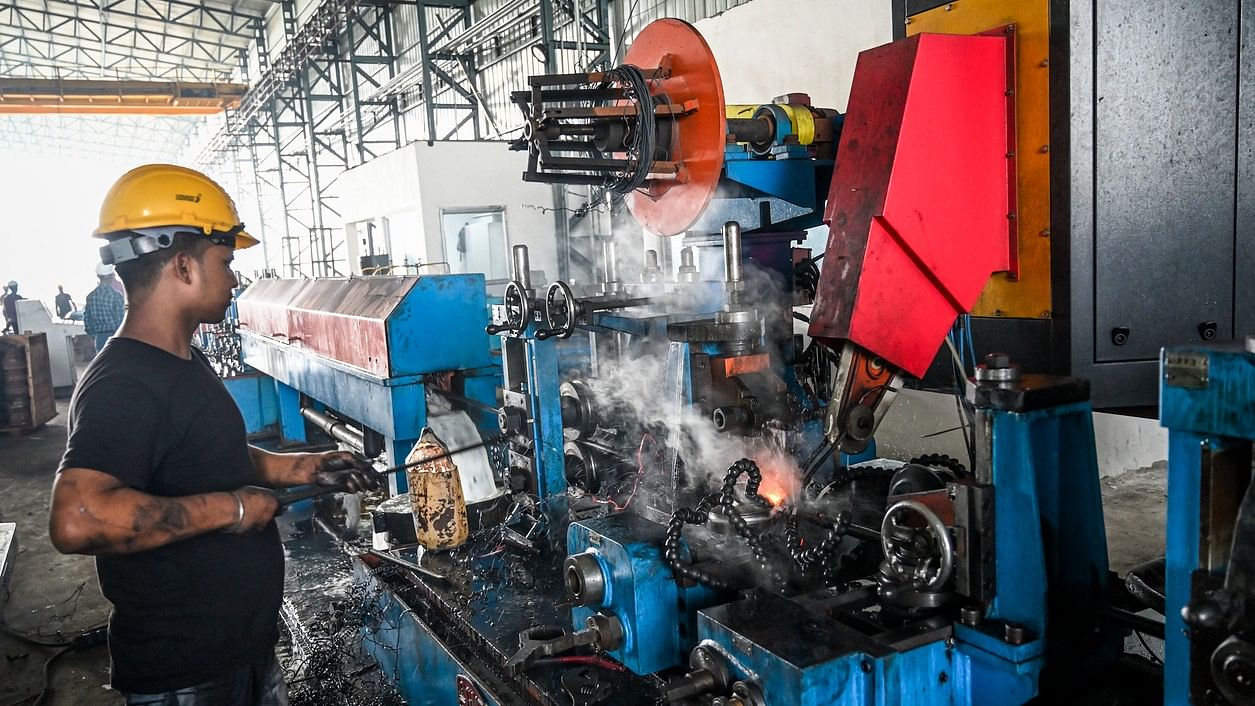
Representative image showing a factory.
Credit: iStock Photo
From the demonetisation of high-value currency notes in 2016 and the rollout of the Goods and Services Tax (GST) in 2017 to the COVID-19 pandemic in 2020-21, India’s micro, small, and medium enterprises (MSMEs), which account for nearly one-third of the country’s GDP, have suffered back-to-back economic shocks.
As per the Annual Survey of Unincorporated Enterprises (ASUSE) report released recently by the Ministry of Statistics and Programme Implementation, the number of people employed in the informal sector dropped from 11.13 crore in 2015-16 to 10.96 crore in 2022-23, a decline of 16.45 lakh or about 1.5 per cent. During this period the number of informal sector enterprises dropped from 6.5 crore to 6.34 crore.
Credit: DH Illustration
The number of unincorporated sector enterprises shut down between 2015-16 and 2022-23 is estimated at 63 lakhs, leading to Rs 11.5 lakh crore economic and about 1.6 crore informal sector job loss, said Sunil Kumar Sinha, Principal Economist, India Ratings and Research (Ind-Ra). “However, this period also coincided with the rise in the formalisation of the economy, which has resulted in robust tax collections,” added Sinha.
As a part of the MSME formalisation initiative, the government led by Prime Minister Narendra Modi launched a free registration process for small enterprises on the Udyam portal in July 2020. The PAN is required for the registration on Udyam portal. For the enterprises not having GSTIN the Ministry of MSME launched the Udyam Assist Platform (UAP) in January 2023. The total number of registered enterprises on Udyam and UAP crossed 4 crores on March 15, 2024, as per data shared by the Union Ministry of MSME.
Globally, more than 90 per cent of micro and small enterprises are in the informal economy. In India, this number is much higher. Around 99.7 per cent of the enterprises in India are in the unorganised sector.
Although the informal sector consists of activities operating outside the regulatory framework like tax and labour laws, their role in the economy is critically important. The MSME sector contributes nearly 30 per cent to India’s Gross Domestic Product (GDP) and nearly 50 per cent of exports. It is the second-largest employer after agriculture. The informal sector also supports the incorporated sector by acting as suppliers and service providers, thereby forming an integral part of the domestic value chain.
As per data analysed by India Ratings & Research, the number of unincorporated sector enterprises (USE) increased by 57 lakhs between 2010-11 and 2015-16, which translates into an addition of about 11 lakh enterprises annually.
Had the macro shocks not taken place during the post-2015-16 period and the growth in USEs followed the pattern between 2010-11 and 2015-16, the total number of USEs would have reached 7.14 crore in 2022-23. Similarly, the number of workers employed would have been 12.53 crore (under the assumption that each USE employs about 1.8 persons, the same as during 2015-16). In other words, there has been a loss of 63 lakh informal establishments and 1.6 crore jobs during the 2015-16 to 2022-23 period.
The size of the informal sector in the nominal rupee terms increased at an average annual rate of 4.3 per cent during the 2015-16 to 2022-23 period against the 12.9 per cent expansion recorded between 2010-11 and 2015-16.
Had the pace of growth of unincorporated sector enterprises (USE) remained at 12.9 per cent during 2015-16 to 2022-23 (the same as 2010-11 to 2015-16) the size of the sector in 2022-23 would have been Rs 26.9 lakh crore while it stood at Rs 15.4 lakh crore. This translates into a cumulative economic loss to the tune of Rs 11.5 lakh crore, which is 4.3 per cent of FY23 nominal GDP, an Ind-Ra analysis showed.
The main opposition Congress party has accused the Modi government of systematic “bludgeoning” of the MSMEs and informal businesses.
The Union Budget 2024-25, which is scheduled to be presented on July 23, is widely expected to be a blueprint for the Modi 3.0 government. During the pre-budget consultations, the MSMEs have lobbied for easier access to finance, hand-holding, and financial incentives in line with the production-linked incentive (PLI) scheme. Financial starvation, technological obsolescence, and sub-optimal size remain the key challenges for the MSMEs. To achieve the vision of ‘developed India’ the growth momentum needs to be accelerated and it is not possible without making the backbone of the economy stronger.